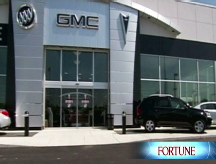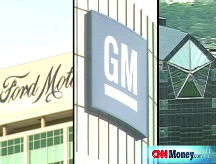Why GM can't survive bankruptcy
Some companies use the courts to reorganize and come out stronger. That would be difficult for GM, experts say.
NEW YORK (CNNMoney.com) -- It worked for the airlines, but it might not work for General Motors. Saving the company through bankruptcy is probably not a viable option for the troubled automaker.
The reasons go deeper than the belief that consumers would shun a vehicle being sold by a bankrupt automaker. Some leading experts said that GM would find it exceedingly difficult to raise the billions in financing it would need to stay in business during a bankruptcy reorganization.
The bottom line: Unlike the experience of United, Delta and Northwest airlines, a GM (GM, Fortune 500) bankruptcy could spell a quick end to the company's operations.
The question of whether GM can survive is crucial to the growing debate in Washington over whether the government should put up $25 billion or more to bail out automakers.
GM on Friday, while saying it was working to avoid a catastrophic bankruptcy, disclosed that it has almost run out of cash and said it needs federal assistance before the end of the year. President Bush, who will be in office until Jan. 20, remains wary of a bailout.
Bailout advocates, including President-elect Barack Obama and the Democratic leaders of the House and Senate, argue that the collapse of a major automaker would be too great a shock for an already struggling U.S. economy to absorb. It is estimated that a GM bankruptcy alone would cascade widely throughout the economy and cost as many as 2.5 million jobs.
Some critics of a bailout have suggested that the automakers would be better off filing for bankruptcy to get out of obligations and contracts they can't afford and become competitive again without putting taxpayer dollars at risk.
There is precedent for bankruptcy turnarounds. But those companies, filing under Chapter 11 of the bankruptcy code, were able to secure what is known as debtor-in-possession, or DIP, financing.
Lenders make such loans in part because bankruptcy law allow them to go to the front of the line of the company's creditors if the company is not able to stay in business. In turn, the bankrupt company uses the cash to make changes and return to profitability.
Without DIP financing, liquidation -- usually under bankruptcy Chapter 7 -- may be the only option left.
Experts in the field and even GM itself say that DIP financing might not be available for GM.
"The state of the capital markets does make the prospects for DIP financing a much bigger question mark than would have been the case in other times," said Bob Schulz, Standard & Poor's senior auto credit analyst. "To reorganize does require financing."
Others question if GM would be shut out of DIP financing entirely. But even they say it would come at a steep price.
"I would say it is likely that they would find some financing," said bankruptcy attorney Ronald Silverman, a member of the American Bankruptcy Institute who recently spoke on the outlook for the auto sector. "It may not be inexpensive financing. But there are investors with cash interested in investment opportunities, and DIP loans are among the most attractive investment opportunities."
Still, the fear that car buyers won't want to buy cars from a bankrupt automaker may preclude GM from financing. For example, a recent survey of car buyers found that as many as 80% wouldn't even consider buying from a bankrupt automaker.
"You don't qualify for DIP if you don't have certainty about your revenue base," said Tony Cervone, a GM vice president.
Some question whether sales in fact would drop following a bankruptcy. University of Maryland economics professor Peter Morici believes automakers could assure buyers by offering warranties backed by third parties, the way bankrupt electronics retailer Circuit City is now doing.
But Mike Jackson, CEO of Autonation (AN, Fortune 500), the nation's largest chain of dealerships, said bankrupt automakers would have a hard time selling cars.
"I deal with consumers every day. They have their investor's hat on when they spend $30,000. They're making a calculation about resale value," Jackson said. "They have so many choices -- why take a gamble on a manufacturer who is in bankruptcy."
Most experts, even some of those who believe that GM would ultimately be able to find the financing it needs, agree that there is far less DIP financing available today because of the credit crisis.
"A year ago we had 30 DIP lenders; you could count on about 20 of them showing up in any big case. It was a buyer's market from a debtor's perspective," said Jack Williams, a bankruptcy law professor at Georgia State University and an ABI resident scholar. "Now we have three or four, maybe five, and they're all very careful."
Still, there are some who believe that GM should use bankruptcy to reorganize. And to them, a lack of financing to reorganize is just another argument against a federal bailout.
"If they can't get financing, then they should just sell the assets and go out of business," said Morici. "That means that bankruptcy reorganization is impractical; it means they can't be viable under any circumstance." ![]()



